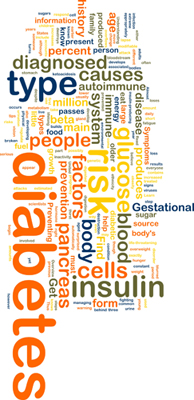Diabetes
 Diabetes is a long-term (chronic) condition caused by too much glucose (sugar) in the blood. It is also known as diabetes mellitus. There are two types of diabetes - type 1 and type 2.
Diabetes is a long-term (chronic) condition caused by too much glucose (sugar) in the blood. It is also known as diabetes mellitus. There are two types of diabetes - type 1 and type 2.
In the absence of a register of people who have diabetes no-one can be entirely sure how many people In Ireland live with diabetes; the Institute of Public Health’s report Making Diabetes Count (2007) estimated that there were about 143,000 people with diabetes in Ireland (based on in 2005 figures) and predicted that this number would increase by 37%, to 194,000 people, by 2015.
More than three-quarters of people with diabetes have type 2 diabetes mellitus. This used to be known as non-insulin dependent diabetes mellitus (NIDDM) or maturity-onset diabetes mellitus. The number of people with type 2 diabetes is rapidly increasing as it commoner in the overweight and obese, which is itself a growing problem.
The remainder have type 1 diabetes mellitus, which used to be known as insulin-dependent diabetes mellitus.
What's the treatment for diabetes?
It's recognised that the sooner the blood sugar levels are brought under control, the better the long term prospects of preventing damage. Lifestyle advice about diet, weight management and regular activity is the first step.
Type 1 diabetes will require immediate insulin therapy, Type 2 diabetes will first be managed with a drug called Metformin, if lifestyle changes alone aren't effective. There are now several other drugs used in type 2 diabetes, although eventually some type 2 diabetics will need insulin therapy as it's a progressive disease
Diabetes UK - How to take a blood glucose test
There is further information and education on the Diabetes UK Video Site
Useful Links
 Diabetes Ireland
Diabetes Ireland
Diabetes Ireland works to provide a quality service in improving the lives of people affected by diabetes, and working with others to prevent and cure diabetes.
HSE - Diabetes
An introduction to both type 1 and type 2 diabetes - the symptoms, cause, diagnosis and treatment.
These links all come from trusted resources but if you are unsure about these or any other medical matters please contact your doctor or pharmacist for advice.